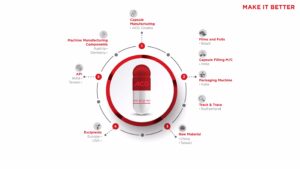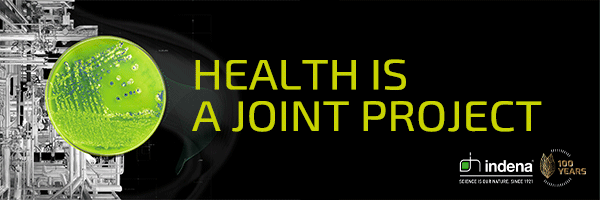Pharmaceuticals
Digitizing to improve communication in the pharmaceutical supply chain 2nd December 2020
By Sukesh Kumar Thogaru is Executive Assistant to the CEO of ACG Inspection Systems Pvt. Ltd., part of ACG Group

Advances in technology have opened up the possibility of overhauling how companies active in the pharmaceutical sector communicate and disseminate information within their supply chains, says Sukesh Kumar Thogaru of ACG Inspection Systems Pvt Ltd.
Historically, the pharmaceutical industry has been slow to respond to new technology and to integrate digital solutions. However, as this globalized industry faces unprecedented challenges from the Covid-19 pandemic, and continued threats from counterfeiters, digitization is the only way forward to ensure safe medicines for all.
Blockchain is one of the key technologies with the ability to transform the way the industry operates and secures its supply chain. The traditional, digitally disparate, supply chain deprives organizations from gaining insights into customer and supplier demand patterns, thus limiting the potential for growth and inhibiting both security and efficiency. With the introduction of digitally enhanced supply chains, powered by blockchain, secure information can flow both ways, which will enable manufacturers to make digitally interconnected supply chains an integral part of their business strategy.
This article examines the three main areas where investment and integration of blockchain will benefit all involved, from suppliers, through to manufacturing, distribution and consumers.

Manufacturing the final dosage form of medicines is a highly complex business. A single capsule, for example, is manufactured using machinery and ingredients from all over the world.
What is blockchain?
Blockchain is a secure, decentralized, digital system in which transactional or historical data is recorded, stored and maintained across a peer-to-peer network of devices or computers called nodes.1 The data and records stored via blockchain are encrypted and unalterable. Similar, in essence, to a banking ledger, with debits and credits, blockchain records transaction information in this digital ledger in real time and distributes the data across the entire network of participants, such as multiple ledgers located in the Cloud.
Every time a singular or multiple transaction is made, a new block is added to the chain. If any hacker or corrupt participant tries to alter a block in the chain, it would be evident that the blockchain had been interfered with because the database is decentralized. In order to make that alteration they would have to alter every block that had been distributed in the chain.
How does it operate in the pharma supply chain?
Acting as an immutable, public, digital ledger, blockchain is of great interest to the pharmaceutical industry because it contains continuously updated, time-stamped and highly encrypted virtual records. Blockchain builds connections between all players in the supply chain, allowing information to be validated, checked and recorded at every step of the process, from raw material to production, manufacturing, packaging and sales/distribution.
The process outlined:
- Someone requests transaction – this could be for a product, service etc
- The requested transaction is broadcast to a peer-to-peer network of consistent global computers or devices, known as nodes. These nodes are all connected and together they run the blockchain.
- The network of nodes validates the transaction and the user’s status using known algorithms.
- Once verified, the transaction is combined with other transactions to create a new block of data for the ledger.
- The new block is then added to the existing blockchain, in a way that is permanent and unalterable.
- The transaction is complete.
Barriers to implementation
There are a large number of reasons why there is not greater investment and integration of blockchain in the pharmaceutical supply chain, which include: costs of investment, lack of standardization, complexity, and the education needed to implement the use and integration of these systems into existing operations.
Another of the reasons for the slow implementation of blockchain on a global scale in the pharmaceutical industry so far has been a lack of comprehension regarding blockchain technology and its purpose in the supply chain. Businesses often fail to grasp, or are not given enough information about, the tangible benefits this technology can have across their company. Companies active in the pharmaceutical sector should work together to overcome the barriers faced in implementing blockchain in order to better ensure the safety of consumers and make huge improvements to the way the industry operates.
Why blockchain?
Blockchains build supply chain integrity – primarily through anticounterfeiting, real-time visibility and compliance. These are the three main areas where blockchain will support the pharmaceutical industry whilst also providing benefits for everyone involved in the process of creating, developing and packaging medicines, with the additional benefit improved safety for the end customer.
Anticounterfeiting
- One estimate from BIS Research shows that global pharma companies lose about $200 billion of business a year due to the counterfeiting of drugs2. However, the issues with counterfeit medicines extend beyond pure financials. Fake medicines also present huge dangers for consumers, often tragically impacting the poorest and most vulnerable communities. The industry must do its utmost to protect individuals from these fake pharmaceutical products.
- If the supply chain is completely connected via a digitized blockchain-based solution, the counterfeiter will not have the same blockchain tools, and therefore when they tryto enter products into the real supply chain, the product will be unauthenticated.
- Blockchain offers huge potential for preventing counterfeiting and theft by protecting the supply chain at every step of the distribution process through layering and securing data. Using track-and-trace serialization and blockchain throughout the network, a drug and its authenticity can be verified through simple duty matrix code. The product can be checked by wholesaler, distributor or retailer etc, so guarantees are made as to the safety and authenticity of the product. There is no scope for data errors or tampering and no limitation on how long the data is stored, nor how often it is accessed.
- The integration of blockchain solutions ensures a fully authenticated supply chain, thus guaranteeing product safety, reducing revenue loss due to false products, and improving trust in the company or brand.
In order to fully leverage blockchain in the fight against fake drugs, regulators need to mandate the use of track-and-trace technology and companies need to strongly consider the use of blockchain. The adoption of blockchain technology could save the health care industry up to $100-$150 billion per year by 2025 in data breach-related costs, IT costs, operations costs, support function costs and personnel costs, as well as through a reduction in the incidents of fraud and counterfeit products.3
Real-time visibility
Blockchain cuts down on the action-reaction process through real-time data communication via the network of nodes. This helps businesses counter inefficiency and speed up processes, while generating greater openness and transparency across the supply chain.
Pharmaceutical production: a complex process
The process of creating medicines is incredibly complex. Take, for example, a single capsule. It looks simple, but with global manufacturing and trade, to make a capsule products, machinery and ingredients from all over the world are needed. In ACG Capsules’ supply chain this looks as follows:
- Excipients that go inside capsules come from across Europe and the USA
- APIs are sourced from India and Taiwan
- Capsules are manufactured in Croatia
- Machines for manufacturing a capsule and packaging it are produced in India
- Serialization for track-and-trace comes from Switzerland
- Films for blister packaging are produced in Brazil
With this intricate and far-ranging process, communication is key. Layering the blockchain network across multiple stakeholders in the entire supply chain enables any participant to have visibility at each step of the supply chain process and this fast, clear transfer of information has a range of benefits as follows:
- It can improve efficiency by developing an optimized inventory in a dynamic supply chain.
- A supply chain that utilizes blockchain will be better able to ensure supplies are on time, there are zero stock outs, inventories are optimized, and JIT (just-in-time) deliveries are enabled.
- Real-time monitoring also allows businesses to better work to offset any issues and take corrective steps.
- Security is guaranteed, as visibility on ingredients and components is passed through each subcontractor, creating a permanent audit trail.
- Real-time data also allows businesses to make better decisions on how and when to procure various ingredients or products, particularly during volatile times, such as the current Covid-19 pandemic, when the supply chain is disrupted.
Compliance: a complicated issue
Compliance is a complicated issue in the global pharmaceutical industry. Each country, and many regions, have their own set of regulations and compliance standards that must be strictly adhered to. Blockchain helps pharmaceutical companies guarantee, and more easily comply with, these standards and regulations through end-to-end tracking of all compliance data points. Consumers can be confident they are receiving products that are absolutely safe and have not been compromised.
For example, some medicines are sensitive to moisture, humidity or heat, and parameters must be maintained whilst manufacturing, packaging, storing and transporting these products. When a drug reaches the consumer, the attributes of the product have to have been adhered to, otherwise efficacy can be compromised.
Deviations from compliance standards can be tracked across the supply chain network, right from manufacturing to the final purchase, by utilizing Cloud-connected factories, IoT and blockchain. IoT sensors can be put at each facility in the process to monitor conditions, from factory, to national and regional storage facilities, through transport and to clinics.
Through blockchain, all information gathered by these sensors will be sent in near real-timeto headquarters, where every aspect of the supply chain can be monitored and the compliance of stakeholders throughout the distribution network can thus be guaranteed. This intelligent, digitized network,, once installed, is a simplified, more accurate method of ensuring compliance and better adherence to standards in the pharma supply chain. Blockchain will simplify monitoring compliance, deliver transparency in business-to-business relationships, and ensure that drugs are secure at all times, which is critical for the safety of consumers and brand image.
Moving forward
Blockchain technology can also transform the way pharma companies track the quality and efficiency of the entire manufacturing process. If this technology is leveraged more heavily (along with AI and IoT), it is possible to identify where improvements can be made. This is done by looking in closer detail at elements across the supply chain and tracking quality and production metrics for each batch produced, the quantities shipped, and the performance of each drug. Integrating these technologies is a big step towards the ultimate goal of using AI to build predictive networks that give the data analysis needed to generate even more improvements in the pharmaceutical sector.
It is essential to work together to make the supply chain flexible, secure and efficient. In this uncertain, fast- changing world, the future of the pharmaceutical industry lies in transforming conventional supply chains to agile, dynamic and interconnected networks that enable a seamless flow of information.
Blockchain is a critical part of protecting and improving the operation of the pharmaceutical supply chain and should not be understated. Implementing this technology delivers real ROI, through its role in anticounterfeiting, developing fast, accurate and clear communication, and improving compliance. It will help the industry thrive through increased efficiency and protect its customers by ensuring consistent, safe and affordable medicines.
1.Healthcare Weekly, “Blockchain in Healthcare”, https://healthcareweekly.com/blockchain-in-healthcare-guide/
2.BIS Research: https://bisresearch.com/industry-report/global-blockchain-in-healthcare-market-2025.html
3.Healthcare Weekly, “Blockchain in Healthcare” Report, https://healthcareweekly.com/blockchain-in-healthcare-guide/


